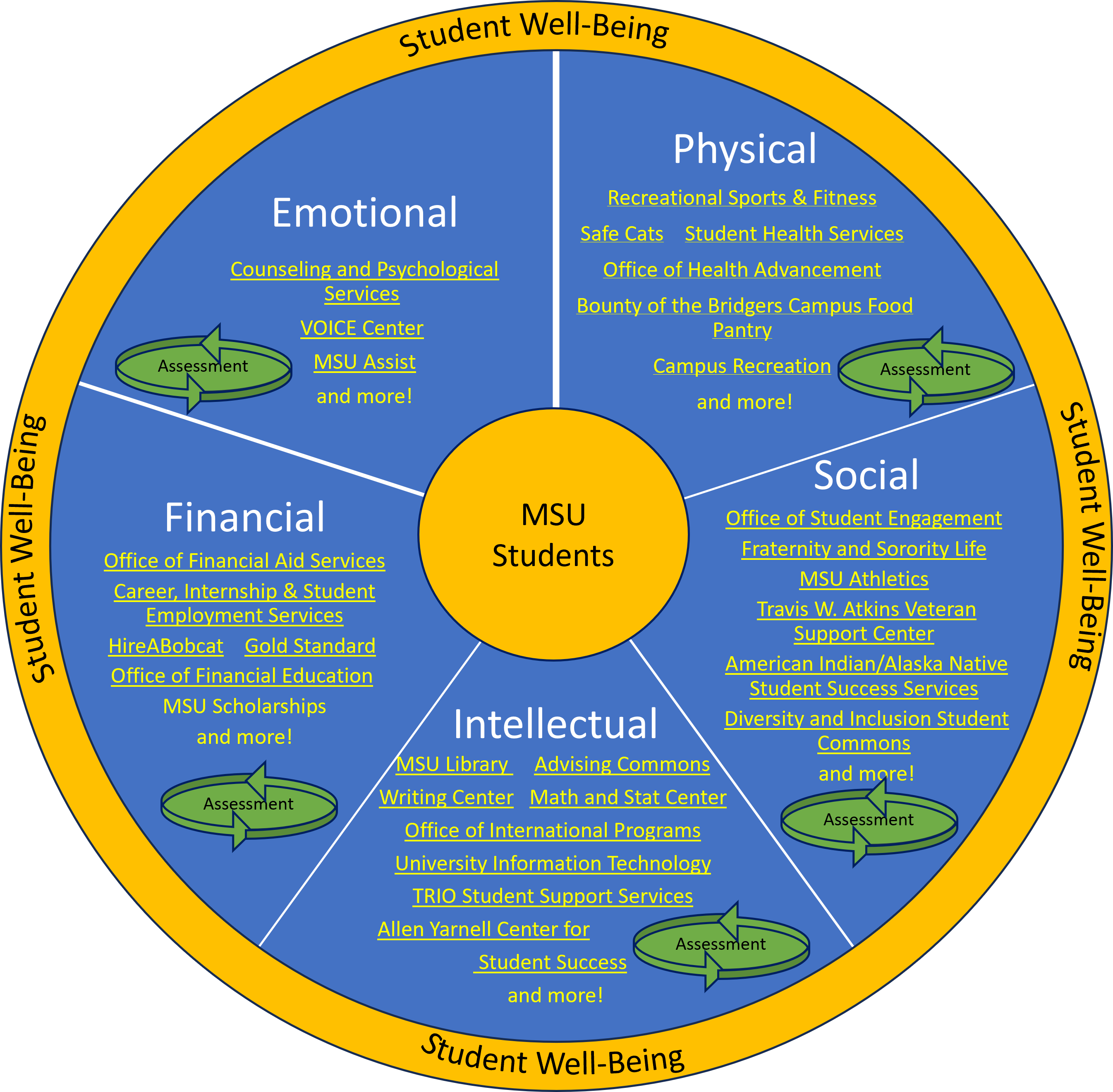Accreditation 101 Module 5 – Supporting Students in a Holistic Way

Figure 1. A generally accepted model of the domains of student well-being (Stoewen 2017) and a sample of the programs, processes, and resources available at MSU that meet these needs and support student well-being. As taught by our own health and human development programs, all domains must be sufficiently fulfilled for students to thrive and succeed in their academic pursuits. The green circles in the diagram reminds us that even co-curricular and student success programs need to assess their effectiveness to continuously improve for the student. A compendium of MSU support services can be found in Appendix A (page 81) of the Year 7 Evaluation of Institutional Effectiveness Accreditation Report.
Module 5 – Supporting Students in a Holistic Way
While universities tend to focus on the intellectual development of the student, students cannot flourish intellectually if other areas of life are dysfunctional or in disarray. All domains of a student’s well-being must be working well enough to allow attention to intellectual development. The MSU Health and Human Development curriculum teaches that one of the generally accepted models (but not the only model) contains the domains of physical, social, emotional, intellectual, and financial/economic human well-being (Stoewen 2017). Addressing each of these domains results in supporting students in a holistic way, allowing them to thrive in their intellectual development.
MSU staff develop and support programs that meet students’ needs in all domains throughout campus. Faculty and advisors are key to directing students to these services and may even integrate activities from several domains into their classes and curriculum to help students. Below are the definitions of each domain and some examples of services at MSU that fulfill each domain. Some services may fulfill needs across domains.
As with academic programs, regular assessment is imperative to continuous improvement and gauging effectiveness of a service. In addition, keeping our Institutional Learning Outcomes in mind as a part of these assessments helps guide our students to become Thinkers and Problem Solvers, Effective Communicators, and Local and Global Citizens. A list of services at MSU and their assessment reporting can be found in Appendix A, page 81, of the Year 7 Evaluation of Institutional Effectiveness Accreditation Report.
Definitions of the domains of well-being and examples of services at MSU that fulfill and support students in these domains
Physical Well-being
Definition: Caring for your body to stay healthy now and in the future
Campus Student Services to Promote Physical Well-Being
- Recreational Sports & Fitness
- Safe Cats
- Student Health Services
- Office of Health Advancement
- Bounty of the Bridgers Campus Food Pantry
- Campus Recreation
- Dental Services
- MSU Athletics
Social Well-being
Definition: Maintaining healthy relationships, enjoying being with others, developing friendships and intimate relations, caring about other and allowing others to care about your, contributing to the larger community
Campus Student Services to Promote Social Well-being
- Veteran Services and the Travis W. Atkins Veteran Support Center
- TRIO Student Support Services
- American Indian/Alaska Native Student Success Services
- Bobcat Parent and Family Program
- Diversity and Inclusion Student Commons
- Fraternity and Sorority Life
- Student Engagement
- MSU Athletics
Emotional Well-being
Definition: Understanding and respecting feelings, values, and attitudes and appreciating the feelings of others; constructively managing emotions in a constructive way; feeling positive and enthusiastic about life.
Campus Student Services to Promote Emotional Well-being
Intellectual Well-being
Definition: Growing intellectually, maintaining curiosity about all there is to learn, valuing lifelong learning, responding positively to intellectual challenges, expanding knowledge and skills while discovering the potential for sharing your gifts with others
Campus Student Services to Promote Intellectual Well-being
- Montana State University Library
- Allen Yarnell Center for Student Success (AYCSS)
- SmartyCats Tutoring
- Return2Learn
- Second Wind
- MSU 101
- Advising Commons
- TRIO Student Support Services
- TRIO McNair Scholars Program
- Writing Center
- Math and Stat Center
- Office of International Programs
- University Information Technology
- Empower
- Caring for Our Own
- Cable Advantage
- The Bracken Center
- Indigenous Pathways in Agriculture
Financial/Economic Well-being
Definition: Preparing for and participating in work that provides personal satisfaction and life enrichment; thoughtfully planning and using financial resources to support the care for oneself, one’s family, and the greater community across the lifecycle.
Campus Student Services to Promote Economic/Financial Well-being
- Office of Financial Aid Services
- Career, Internship & Student Employment Services
- 1893 Scholarship Program
- HireABobcat
- Gold Standard
- Office of Financial Education
- MSU Scholarships available through colleges and departments
Source for the Definitions of the Various Domains of Well-being: Stoewen DL. Dimensions of wellness: Change your habits, change your life. Can Vet J. 2017 Aug;58(8):861-862. PMID: 28761196; PMCID: PMC5508938.
